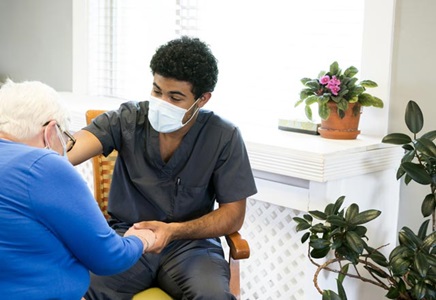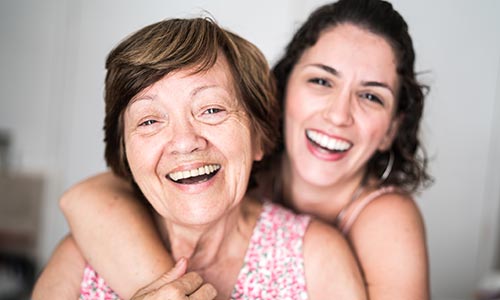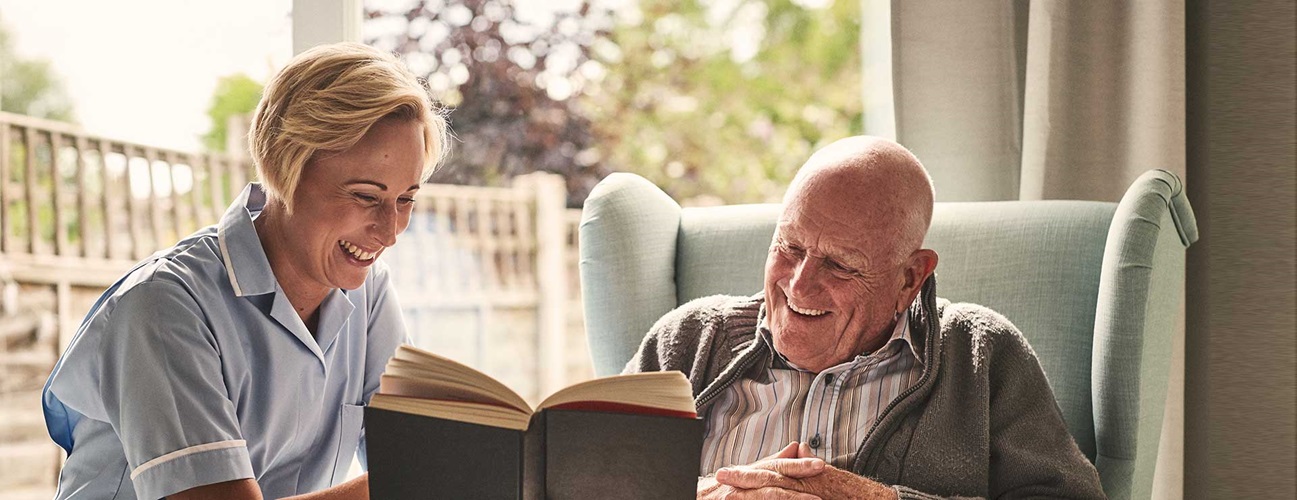Being a Caregiver
What is a caregiver?
A caregiver provides assistance in meeting the daily needs of another person. Caregivers are referred to as either "formal" or "informal." "Formal" caregivers are paid for their services and have had training and education in providing care. This may include services from home health agencies and other trained professionals.
"Informal" caregivers, also called family caregivers, are people who give care to family or friends usually without payment. A caregiver gives care, generally in the home environment, for an aging parent, spouse, other relative, or unrelated person, or for an ill, or disabled person. These tasks may include transportation, grocery shopping, housework, preparing meals. Also giving assistance with getting dressed, getting out of bed, help with eating, and incontinence.
If you fit the description of a family, or "informal" caregiver, you are not alone. According to the American Association of Retired Persons (AARP) and the National Alliance for Caregiving (NAC), estimates of more than 65.7 million Americans serve as informal caregivers either to a child with special needs or an adult who lives in the community and needs help.
Most caregivers (86%) are related to the care recipient with about a third caring for a parent. The average age of a caregiver is 49. Most caregivers are women (66%), but men also serve as caregivers. It is also a myth that most of the elderly are cared for in nursing homes in the U.S. Most long-term care is provided by family and friends in the home. Only 11% live in a nursing home or an assisted-living facility.
It is unfortunate that experts estimate that 1.3 million to 1.4 million children, ages 8 to 18, care for an adult relative. Three-fourths of these children care for a parent or grandparent. Their responsibilities may range from bathing, dressing, assisting with mobility, preparing meals, dispensing medicines, and communicating with medical staff. They do all this and their own school work, too.
Treatment Support your Loved Ones with Personal Care Services

Called to Care® | A Program For Family Caregivers
We recognized the importance of family caregivers, as well as the physical and emotional stresses that can accompany caregiving. Hear how Johns Hopkins Bayview prepares and supports those caring for loved ones with health-related needs or limitations.
Family member or a private caregiver: What should be considered?
Caring for an ill, aging, or disabled person can be a rewarding experience. However, depending on the level of care needed and other demands on the caregiver's time and energy, it can also become an overwhelming responsibility. When this happens, it may be time to explore other home health care choices, like hiring a private caregiver. Here are some questions to ask yourself when considering a private caregiver:
-
How much time is needed to help care for the individual at home? Is this likely to increase or decrease over time?
-
What skill level is necessary to provide the best care for the individual at home?
-
Are family members and friends capable of providing the necessary care without any 1 individual becoming overburdened?
-
How does the ill, aging, or disabled individual feel about having a private caregiver assist with his or her care? Is he or she comfortable with the idea of a private caregiver? Does he or she understand the caregiver's need for care assistance?
Family Caregiving Guide

Are you a family caregiver? This guide provides valuable information and resources to make your journey as easy as possible.
Your Search for Care
If the decision is made to hire a private caregiver, you will want to explore many choices. Also, it will be important to acknowledge and include the desires of the person who will be receiving care. Consider the following questions in your search for appropriate care:
-
What services would be required of the caregiver? (Try writing a job description outlining exactly what would be expected of a caregiver.)
-
Is the individual employed by an agency or organization licensed by the state?
-
What specific services will the caregiver provide, and will these services match your job description?
-
Will the patient's Medicare pay for the service? If not, decide exactly how services will be paid.
-
What are the qualifications of the person or people giving care?
-
Will the same person or people always be available, or will it be necessary to adjust to many different caregivers?
-
Does the agency or organization offer flexibility, making care available on weekends, at nights, and on holidays, for example?
-
How does the agency or organization make sure that its employees treat their patients and patient families with respect?
A report from the AARP revealed an increase in the participation of "informal" caregivers to provide care for older persons with disabilities and a decrease in the use of paid "formal" caregivers. As a result, there is growing concern about the well-being of the "informal" caregiver. Caregiver health self-assessment questionnaires are available to help evaluate behavior and health risks. The National Family Caregiver Support Program can offer help and support in areas like chore services, education, and counseling.
Family Caregiver Toolbox

One of the challenges faced by those who have been called to care is taking good care of themselves. Learn how to manage caregiver stress and take better care of yourself.






